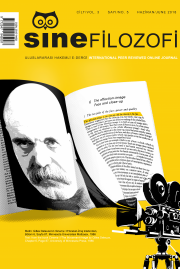Hegel’in Efendi-Köle Diyalektiği Çerçevesinde Spartacus (Spartaküs) Filmi Üzerine Düşünceler
Opinions On Film Spartacus Within the Framework of Hegel’s Master-Slave Dialectics
Author(s): Gökhan GültekinSubject(s): German Idealism, Film / Cinema / Cinematography, Phenomenology
Published by: Serdar Öztürk
Keywords: Cinema; Hegel; master-slave dialectical; Spartacus;
Summary/Abstract: Philosophy trying to grasp the Universe as a whole may make all kinds of opinions that a human may encounter its own subject. This shows that philosophy may have unlimited content in terms of the subject. Therefore, philosophy can reveal its presence wherever a human is found. Cinema is one of these areas. Although cinema has the power to establish and show a totally new world, apart from the known world and creatures in this world, it has never given up human characters. In this respect, thinking in a humanistic way in cinema may be realized through various philosophers, and Hegel, which has an important place in the history of philosophy, can be appropriate for being under consideration in cinema as totally a people-oriented philosopher. Therefore, to assess his ‘dialectical method’ and ‘the master-slave dialectic’ that forms a basis of this method in cinema constitutes the purpose of this study. In this context, Spartacus (Stanley Kubrick, 1960) was analyzed in this study in terms of its compliance with the master-slave dialectic within the framework of Hegel’s dialectical method (phenomenological method).
Journal: SineFilozofi
- Issue Year: 3/2018
- Issue No: 5
- Page Range: 25-44
- Page Count: 20
- Language: Turkish

